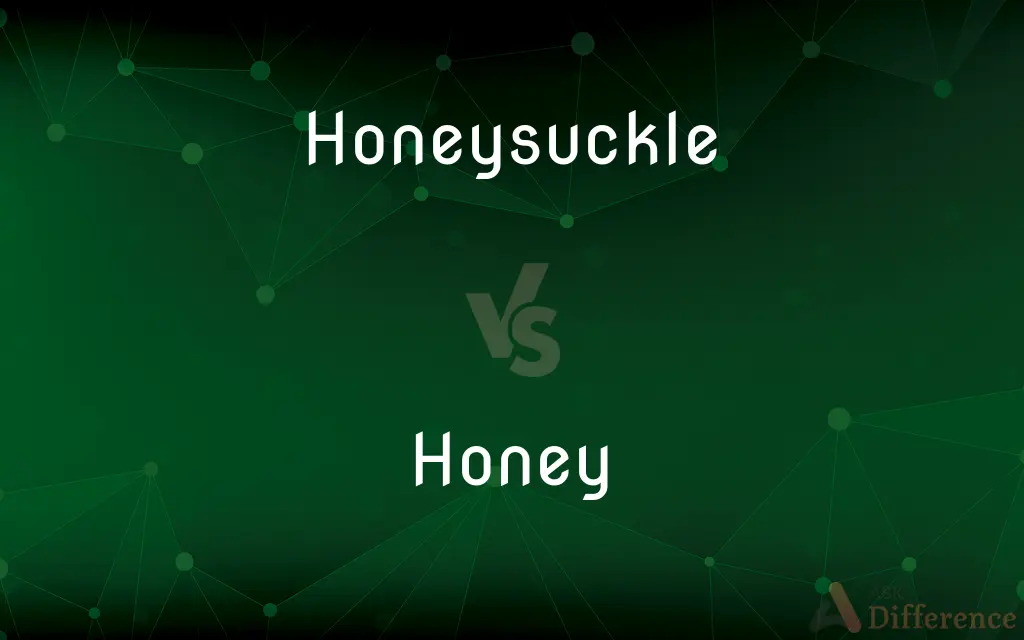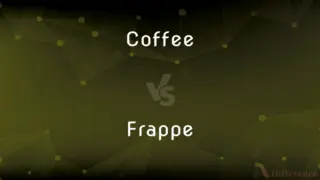Honeysuckle vs. Honey — What's the Difference?
Edited by Tayyaba Rehman — By Fiza Rafique — Updated on April 22, 2024
Honeysuckle is a fragrant flowering plant often found in gardens, whereas honey is a sweet, viscous food substance produced by bees from floral nectar.

Difference Between Honeysuckle and Honey
Table of Contents
ADVERTISEMENT
Key Differences
Honeysuckle plants are known for their sweet-smelling, bell-shaped flowers, which come in various colors like white, yellow, and pink. On the other hand, honey is a natural sweetener known for its golden color and thick texture, made by bees as a food source.
The flowers of honeysuckle can be used in the preparation of herbal teas and remedies, owing to their medicinal properties. Whereas, honey is widely used as a sweetener in various cuisines and also possesses antibacterial and anti-inflammatory properties.
While honeysuckle's aroma is highly valued in perfumery and aromatherapy, honey’s taste is cherished in culinary applications, from baking to beverage sweetening.
In gardening, honeysuckle is often planted to attract pollinators like bees and butterflies due to its nectar. Meanwhile, the production of honey involves the active participation of bees, who collect nectar from flowers including honeysuckles and convert it into honey.
Honeysuckle is appreciated primarily for its decorative and aromatic qualities in landscapes, while honey is prized for its nutritional and therapeutic benefits in health and wellness circles.
ADVERTISEMENT
Comparison Chart
Type
Plant
Food substance
Primary Use
Decoration, fragrance, and herbal medicine
Sweetening, cooking, and medicinal use
Production
Grown in gardens and wild areas
Produced by bees from nectar
Sensory Appeal
Aromatic flowers
Sweet taste
Health Benefits
Used in traditional remedies for digestive and respiratory issues
Anti-inflammatory, antibacterial, and used in wound healing
Compare with Definitions
Honeysuckle
Attracts pollinators like bees and butterflies.
Honeysuckle vines in our backyard attract numerous butterflies.
Honey
Used as a natural remedy for coughs and colds.
He took a spoonful of honey to relieve his cough.
Honeysuckle
Belongs to the Caprifoliaceae family.
Honeysuckle varieties vary widely but all belong to the Caprifoliaceae family.
Honey
Has a long shelf life due to its antibacterial properties.
Stored properly, honey can remain edible for years.
Honeysuckle
Can be invasive in some environments.
Honeysuckle has overgrown in the wild areas near the river.
Honey
Contains nutrients like vitamins and antioxidants.
Honey is not only sweet but also rich in beneficial antioxidants.
Honeysuckle
A plant known for its sweet-smelling, tubular flowers.
The garden was bordered with pink and yellow honeysuckle.
Honey
A sweet, viscous liquid produced by bees.
She drizzled honey over her pancakes for breakfast.
Honeysuckle
Often used in herbal medicines and teas.
She brewed a tea with honeysuckle to soothe her sore throat.
Honey
Can be sourced from different flowers, affecting its flavor.
Clover honey is lighter in taste compared to the robust buckwheat honey.
Honeysuckle
Honeysuckles (Lonicera, ; syn. Caprifolium Mill.) are arching shrubs or twining vines in the family Caprifoliaceae, native to northern latitudes in North America and Eurasia.
Honey
Honey is a sweet, viscous food substance made by honey bees and some related insects, such as stingless bees. Bees produce honey from the sugary secretions of plants (floral nectar) or from secretions of other insects (such as honeydew), by regurgitation, enzymatic activity, and water evaporation.
Honeysuckle
Any of various shrubs or vines of the genus Lonicera, having opposite leaves, fragrant, usually paired tubular flowers, and small berries.
Honey
A sweet, sticky yellowish-brown fluid made by bees and other insects from nectar collected from flowers.
Honeysuckle
Any of various similar or related plants.
Honey
An excellent example of something
It's one honey of an adaptation
Honeysuckle
Any of the many species of arching shrubs and climbing vines of the genus Lonicera in the Caprifoliaceae family, many with sweet smelling, bell shaped flowers.
Honey
A sweet yellowish or brownish viscid fluid produced by various bees from the nectar of flowers and used as food.
Honeysuckle
Any of several species of superficially similar plants from Australia
Honey
A similar substance made by certain other insects.
Honeysuckle
Banksia aquilonia (northern banksia)
Honey
A sweet substance, such as nectar or syrup.
Honeysuckle
Banksia integrifolia (coast banksia)
Honey
Sweetness; pleasantness
"The first few years could not have been all honey" (Nadine Gordimer).
Honeysuckle
Banksia marginata (silver banksia)
Honey
(Informal) Sweetheart; dear. Used as a term of endearment.
Honeysuckle
Banksia serrata (red honeysuckle)
Honey
(Informal) Something remarkably fine
A honey of a car.
Honeysuckle
Lambertia multiflora (many-flowered honeysuckle)
Honey
To sweeten with honey; add honey to.
Honeysuckle
One of several species of flowering plants, much admired for their beauty, and some for their fragrance.
Honey
To make pleasant or appealing
His words were honeyed as he spoke.
Honeysuckle
Shrub or vine of the genus Lonicera
Honey
To give a yellow or golden color to.
Honeysuckle
Shrubby tree with silky foliage and spikes of cylindrical yellow nectarous flowers
Honey
(uncountable) A viscous, sweet fluid produced from plant nectar by bees. Often used to sweeten tea or to spread on baked goods.
The honey in the pot should last for years.
Honeysuckle
Columbine of eastern North America having long-spurred red flowers
Honey
(countable) A variety of this substance.
Honey
(rare) Nectar.
Honey
(figuratively) Something sweet or desirable.
Honey
A term of affection.
Honey, would you take out the trash?
Honey, I'm home.
Honey
A woman, especially an attractive one.
Man, there are some fine honeys here tonight!
Honey
A spectrum of pale yellow to brownish-yellow colour, like that of most types of (the sweet substance) honey.
Honey
Involving or resembling honey.
Honey
Of a pale yellow to brownish-yellow colour, like most types of honey.
Honey
(transitive) To sweeten; to make agreeable.
Honey
(transitive) To add honey to.
Honey
(intransitive) To be gentle, agreeable, or coaxing; to talk fondly; to use endearments.
Honey
(intransitive) To be or become obsequiously courteous or complimentary; to fawn.
Honey
A sweet viscid fluid, esp. that collected by bees from flowers of plants, and deposited in the cells of the honeycomb.
Honey
That which is sweet or pleasant, like honey.
The honey of his language.
Honey
Sweet one; - a term of endearment.
Honey, you shall be well desired in Cyprus.
Honey
To be gentle, agreeable, or coaxing; to talk fondly; to use endearments; also, to be or become obsequiously courteous or complimentary; to fawn.
Rough to common men,But honey at the whisper of a lord.
Honey
To make agreeable; to cover or sweeten with, or as with, honey.
Canst thou not honey me with fluent speech?
Honey
A sweet yellow liquid produced by bees
Honey
A beloved person; used as terms of endearment
Honey
Sweeten with honey
Honey
Having the color of honey
Common Curiosities
What are the health benefits of honey?
Honey offers antibacterial and anti-inflammatory properties, and it's used in treating wounds and respiratory issues.
What are the main differences between honeysuckle and honey?
Honeysuckle is a flowering plant used in decoration and herbal remedies, whereas honey is a sweet food product made by bees.
Can you eat honeysuckle flowers?
Yes, some varieties of honeysuckle flowers are edible and can be used in salads or brewed into teas.
How is honey harvested?
Honey is collected from the combs of beehives, where bees store honey they have made from flower nectar.
Can honey spoil?
Honey does not spoil if stored properly due to its natural preservatives and low moisture content.
Is honeysuckle good for wildlife?
Yes, honeysuckle attracts pollinating insects and provides shelter and nesting sites for birds.
Are there different types of honeysuckle?
Yes, there are many types of honeysuckle, each with unique flowers and growing habits.
How do bees use honeysuckle?
Bees collect nectar from honeysuckle flowers, which they convert into honey.
Why is honeysuckle important in gardening?
Honeysuckle is valued for its attractive, fragrant flowers and its ability to attract beneficial pollinators.
Can honeysuckle be used in perfumes?
Yes, honeysuckle's sweet and strong fragrance makes it a popular choice in the formulation of perfumes.
Is honeysuckle harmful to any animals?
Certain varieties, particularly the Japanese honeysuckle, can be invasive and harmful to local flora and fauna.
Can honey be used topically?
Yes, honey is often used topically in skincare for its moisturizing and antibacterial properties.
How does the flavor of honey vary?
The flavor of honey varies depending on the types of flowers from which the bees collect nectar.
What are the culinary uses of honey?
Honey is used in baking, cooking, as a spread, and in beverages as a natural sweetener.
What is raw honey?
Raw honey is honey as it exists in the beehive, unfiltered and not heated, retaining more natural enzymes and nutrients.
Share Your Discovery

Previous Comparison
Coffee vs. Frappe
Next Comparison
Licence vs. LicensedAuthor Spotlight
Written by
Fiza RafiqueFiza Rafique is a skilled content writer at AskDifference.com, where she meticulously refines and enhances written pieces. Drawing from her vast editorial expertise, Fiza ensures clarity, accuracy, and precision in every article. Passionate about language, she continually seeks to elevate the quality of content for readers worldwide.
Edited by
Tayyaba RehmanTayyaba Rehman is a distinguished writer, currently serving as a primary contributor to askdifference.com. As a researcher in semantics and etymology, Tayyaba's passion for the complexity of languages and their distinctions has found a perfect home on the platform. Tayyaba delves into the intricacies of language, distinguishing between commonly confused words and phrases, thereby providing clarity for readers worldwide.















































